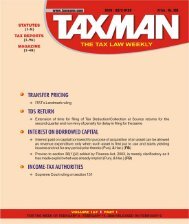CPT V24P7-Art1 (Content).pmd - Taxmann
CPT V24P7-Art1 (Content).pmd - Taxmann
CPT V24P7-Art1 (Content).pmd - Taxmann
You also want an ePaper? Increase the reach of your titles
YUMPU automatically turns print PDFs into web optimized ePapers that Google loves.
Company Law<br />
301 of the Companies Act, 1956, disclosing<br />
whether the transaction under section 301 is<br />
based on arm’s length price or not, preferential<br />
allotment to interested party, etc.<br />
2.2 Accounting Standard 18 (AS 18) - To make<br />
an investor aware of the related party<br />
transactions, the Institute of Chartered<br />
Accountants (ICAI) has introduced the AS 18<br />
“Related Party Disclosures”. Every company<br />
must comply with AS 18 including small and<br />
medium sized companies as per Accounting<br />
Standard Rule, 2006. The objective of this<br />
standard is to establish requirements for<br />
disclosure of related party relationships and<br />
transactions between reporting enterprises and<br />
their related parties.<br />
As per Accounting Standard (AS 18), “Related<br />
party” means “Parties are considered to be<br />
related, if at any time during the reporting<br />
period one party has the ability to control the<br />
other party or exercises significant influence<br />
over the other party in making financial and/<br />
or operating decisions”. Further “Related Party<br />
transaction” means transfer of resources or<br />
obligations between related parties, regardless<br />
of whether or not a price is charged. An enterprise<br />
or an individual is considered to have a<br />
substantial interest in another enterprise, if<br />
that enterprise owns, directly or indirectly,<br />
20% or more interest in the voting power of<br />
the other enterprise. If there have been<br />
transactions between related parties, during<br />
the existence of a related party relationship,<br />
the reporting enterprise should disclose the<br />
following:-<br />
u Name of the transacting related party,<br />
u relationship and nature of transaction with<br />
related party,<br />
u volume of transaction,<br />
u amounts written off or written back in the<br />
period in respect of debts due from or to<br />
related party.<br />
Scope of AS 18 is wider than the Companies<br />
Act, 1956. Directors and their relatives, key<br />
698<br />
managerial personnel and their relatives who<br />
control or influence decision making of the<br />
company, holding companies and their subsidiary<br />
companies, associates and joint ventures are<br />
covered under related parties. In the Companies<br />
Act the approval is required only if the director<br />
or his relative is involved in transactions. The<br />
company makes disclosure of related party<br />
transactions in the given format in financial<br />
statement of the company. For example, purchase<br />
or sale of goods and fixed assets, agency<br />
arrangements, leasing or hire purchase<br />
arrangements, transfer of Research and<br />
Development, license agreement, finance<br />
guarantee, management contracts, rendering<br />
or receiving of services, etc. Such disclosures<br />
help in an understanding of the financial<br />
statement.<br />
2.3 SEBI - Its rules, regulations -<br />
August 1 to 15, 2012 u TAXMANN’S CORPORATE PROFESSIONALS TODAY u Vol. 24 u 78<br />
2.3.1 Listing Agreement - Listing Agreement is<br />
an important document which is to be executed<br />
by the company with the Stock Exchange where<br />
its shares are proposed to be listed. The company<br />
must follow and implement the provisions<br />
relating to related party under Listing Agreement.<br />
For example, the audit committee of the company<br />
must review related party transactions in their<br />
meetings; the company should place periodically<br />
before the audit committee a statement in a<br />
summarized form of transactions with related<br />
parties in the ordinary course of its business<br />
and the company should make disclosures in<br />
compliance with the Accounting Standard on<br />
“Related Party Disclosures” in its Annual Report,<br />
etc.<br />
2.3.2 SEBI (Insider Trading) Regulation, 2011 -<br />
Insider trading means act of subscribing, buying<br />
and selling or agreeing to subscribe, buy, sell<br />
or deal in securities by an insider who is<br />
connected with the company and who is<br />
reasonably expected to have access to<br />
unpublished price sensitive information in respect<br />
of securities or who has received or has access<br />
to unpublished price sensitive information. The<br />
purpose of this dealing is to make personal<br />
profit at the expense of other investor who











![“FORM NO. 3CEB [See rule 10E] Report from an ... - Taxmann](https://img.yumpu.com/45480232/1/190x245/form-no-3ceb-see-rule-10e-report-from-an-taxmann.jpg?quality=85)





